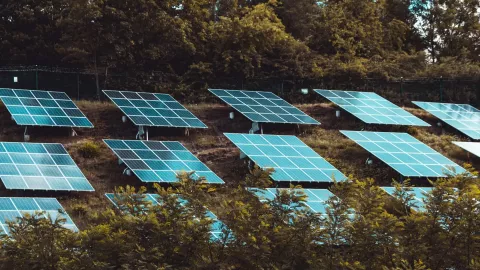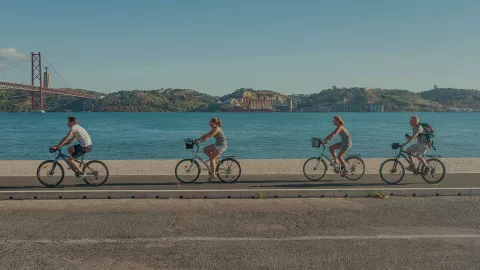EDP's role
With the percentage of the world's population living in cities growing at a fast pace, it is increasingly urgent to address territories with the concern of sustainability. Not only must life in cities be rethought in a more balanced and functional way, it is also necessary to invest in more rural areas, in order to ensure a more balanced distribution of resources and people who, otherwise, will continue to move to urban centers, in search of better life opportunities.
With this in mind, just in 2019, the EDP group has invested 26 million euros in projects in the communities where it is present, whether large urban centers or more rural, and even isolated, regions, in projects ranging from the promotion of urban mobility to energy efficiency of homes, businesses and all types of buildings, including support for ancestral traditions which mark the history of countries where EDP is present. Specifically in relation to SDG 11, dedicated to Sustainable Cities and Communities, EDP invested, in 2020, 13.1 million euros in 2020. But the goals are much more ambitious: raising this investment to 50 million by 2025.
Innovate to make cities smarter
Innovation and research are essential for cities to be smarter and, therefore, more sustainable. In this sense, the EDP group, through NEW, has fundamental projects for the development of cities, such as:
- Sharing Cities – with Lisbon's downtown, in Portugal, as one of its core cities, this project aims to "create a scale for the development of the smart cities market in Europe, through the promotion of solutions for smart cities that can be integrated into complex urban environments, based on common needs”;
- Pocityf – this is a project that develops a new way of producing and consuming energy in historic cities, having Évora, in Portugal, and Alkmaar, in the Netherlands, as pilot cities;
- AmBIENCe - a project that aims to expand the concept of Energy Performance Contracts to buildings considered "active" (with affordable flexibility and likely to be valued) and make it available for a wider range of buildings.
There are also other projects of the group on topics related to Sustainable Cities, such as EUniversal, a project founded by the European Union, of which E-REDES (Portuguese abbreviation for Regulated Electricity Distribution Company, in Portugal) is the coordinator, and which aims to make distribution systems more flexible, or IANOS, which aims to demonstrate solutions capable of significantly increasing the energy efficiency of island regions, as well as reducing their carbon footprint.
Bet on electric mobility
Electrification is the way to reduce the consumption of fossil fuels and fight phenomena such as Climate Change, increasing general Air Quality, but particularly in cities, where the number of combustion vehicles not only causes an excessive traffic, it also compromises the quality of life, as it is largely responsible for the levels of pollution. Did you know that 25% of CO2 emissions are caused by the transport sector? These emissions have been growing 2% a year, so without mitigation measures they will almost double in 2050. For this reason, electric mobility is a major bet for EDP, which has sought to develop and invest in the investigation of more sustainable solutions, and which aims to have, by 2022, in Portugal, 100 thousand customers with electric mobility - a value for which an increasingly wide range of EDP's commercial areas will contribute a great deal, as well as partnerships, such as UVE and ChargeUp Europe. In addition, internally, EDP assumed the commitment of, by 2030, having a 100% electric light vehicle fleet.
It was EDP that launched the first service for electric car users in Portugal, already in 2014, with special tariffs at night to encourage overnight charging, having developed partnerships with the main manufacturers of electric vehicles (EV) over the years. At this moment, EDP Comercial offers several EV charging solutions, for individuals or companies.
When it comes to Spain, EDP launched the Move On application, which shows all the available public charging stations on the map, as well as their cost, and allows for their activation via mobile phone, without the need for a card
In Brazil, EDP created in 2018, in partnership with BMW and with the support of Postos Ipiranga, the largest corridor for electric vehicles in Latin America. The 430 km of the Presidente Dutra Highway, which connects Rio de Janeiro to São Paulo, the two main cities in Brazil, ensured from then on the circulation of electric vehicles, with the placement of five charging stations separated by a maximum of 122 km.
Connection to the rural world
Supporting more rural areas is important for life in cities too, since one of the great pressure points of life in urban centers is precisely due to their excessive population growth, in part due to the exodus from rural areas to cities, in search of better living conditions and more work opportunities. Therefore, investing in the development of more rural areas is betting on a more balanced distribution of resources and population and, consequently, on a more sustainable life in cities as well.
Taking this reality into account, in Brazil, EDP Renováveis developed an initiative to help farmers in areas where the company's wind farms are installed. The EDP Renováveis Rural program, in partnership with various entities, has already supported more than 800 producers from 26 communities, mostly with technological equipment and training. With this program, the income of these families grew by up to 58%.
In Portugal, also linked to the EDP Group's electricity production areas, there is the Traditions program, which finances and monitors projects that seek to value regional and local traditions, allowing their development. The area of influence of this program extends over 81 municipalities and, in the 2020-2021 edition, 10 projects were chosen, from the north to the south of the country, supported with a total of 213 thousand euros.
We want to do more for the communities, cities and countries where we are present. For this reason, EDP is present in all types of cities and regions, and its ambition is to help ensure the sustainability of all.

